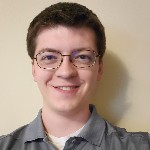
Hortonville High School has always prided itself on offering a wide variety of courses for its computer science students, according to staff members Jodie Schmitt, Business and Computer Science Teacher, and Science Teacher Scott Brielmaier. These include web design, networking, and more. But what do you do when you have a go-getter student who runs out of computer science and math classes?
Ben Nowotny was just such a student. “Probably the biggest turning point was robotics [in elementary school],” he says. “The fact that you can build something that you see move at the end of it, that's especially rewarding.”
Self-motivated and hard-working, “Ben has a special gift with problem-solving and computers,” says Mr. Brielmaier.
“I always liked math,” continues Ben, who saw a book on calculus in middle school and thought, “this is something really cool that I want to learn more about.”
“And that drove me to do even more math,” he says.
By the time he was a sophomore, Ben had maxed out Hortonville’s math classes. That didn’t stop him, though. After learning about the Early College Credit Program (ECCP) from Hortonville’s counseling team, he started taking classes through University of Wisconsin Online and then University of Wisconsin-Milwaukee.
Around the same time, Microsoft Philanthropies was looking for sites to pilot its Technology Education and Learning Support (TEALS) program, which builds sustainable computer science (CS) programs in high schools by pairing teachers with industry volunteers and proven curricula to help them learn to teach CS. The program offers curriculum and support for students of all demographics and backgrounds, particularly underrepresented populations. Microsoft aimed to increase the number of students with digital skills, especially computer science and coding, and also wanted to increase the number of computer science teachers. TEALS would be a big win for Ben, Hortonville, and Microsoft.
According to Ms. Schmitt and Mr. Brielmaier, it has been a fantastic program not only for their students, but also their own professional development. The program enabled both of them to earn extra certification in computer science education.
The TEALS volunteers at Hortonville were from Skyline Technologies, Thrivent, and Plexus. “Their insight into what programming in a professional job was like was really helpful to show me some of the good standards,” says Ben.
At the time, Plexus was thinking about starting a Youth Apprenticeship program, and Ben made the perfect first candidate. Youth Apprenticeship (with Plexus), ECCP, and the TEALS program accelerated Ben’s college career. He graduated in three years from UW-Madison with majors in computer engineering, computer science, and math. He is a software engineer with Plexus.
The good news for schools throughout Wisconsin is that by partnering with local colleges and businesses, these three approaches—Youth Apprenticeship, ECCP, and TEALS—are available to a majority of schools in the state! Supercharge your programs this year!